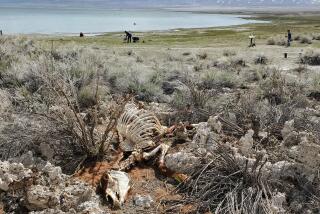Rancher Gives Life for Wild Horses
- Share via
PLAINVIEW, S.D. — As the years passed and her arthritis worsened, Helen Altfillisch found it tougher and tougher to ride herd on the 300 wild horses and the other critters on her ranch.
But with the help of friends, a pair of crutches and the old pickup that she drove on her 8,000 acres, she scratched a living from the western South Dakota ranch she had run since her father died nearly 40 years ago.
She raised cattle for income, horses for love, friends say.
She rode horses when she was younger, but she could not ride them or break them in recent years as her hip joints deteriorated. She let the horses run wild on the rolling grasslands and the cottonwood-studded valley.
The dominant stallions each gathered a family in what probably was the last privately owned herd of wild horses in South Dakota.
“She sure loved those horses. . . . She always thought first of them and last of herself,” said rancher Jim Collins, a neighbor and friend who for many years helped Altfillisch with work she could not do alone.
She took pride too in not asking for help. When her pickup broke down in a pasture last winter, she used her crutches and started walking home about 3 p.m. She finished the 2 1/2-mile trek to her house at 4 a.m., Collins said.
That tenacity is probably why she didn’t use her cellular phone and wait for help when she found a colt mired in the mud on her ranch in May.
Instead, the 71-year-old woman left her pickup, grabbed her crutches and waded into the 2-foot-deep muck to help the colt.
Neither Altfillisch nor the colt made it out of the silted-in stock dam.
John Rhoden, a Meade County sheriff’s deputy who was among the first on the scene, described a kind of honor guard of animals--wild horses, prairie dogs and a coyote--standing nearby. “It was quite a send-off,” he said.
“Her love for the horse just took her out there,” Rhoden added. “It’s kind of the way she lived her life. She was really independent.”
Altfillisch spent virtually her entire life on the ranch about 100 miles west of Pierre, the state capital. She attended South Dakota State University briefly, but returned home to help her ailing father and never made it back to college.
After he died in 1961, she ran the ranch and cared for her mother until her death. Altfillisch had dresses for social occasions but spent most of her time in bluejeans, work shirts and a much-mended jacket.
In 1983, she told a reporter she had no regrets about her life, and about never marrying. “The way things worked out, it didn’t work out.”
Instead, she poured her attention and affection into the ranch and the horses, right up to the moment of her death.
Without their keeper, Altfillisch’s horses had to be sold to help pay off ranch loans. Family and friends rounded them up, loaded them on trucks and took them to the Philip Livestock Auction about 50 miles away.
Friends, neighbors and relatives paid tribute to her grit, gumption and kindness--”one of a kind,” someone said--when they gathered at the sale barn recently for the auction of her 299 horses.
“I think she’d probably have cried today if she’d been here,” Collins said.
Still, recalling times working with his good friend over the years, he grinned. Though he worried whenever she walked among horses, she was always fine when the dust cleared.
When they rounded up horses, he said, she would use her pickup to herd the running animals. Dust flew 50 feet into the air when she gunned it.
“It was sure comical to watch her out there chasing horses,” Collins said. “They didn’t get away.”
The sale of wild horses drew several hundred people. Some came to buy; others were simply curious. One by one, the horses were led into the sale ring and paraded. Some snorted or whinnied as they trotted nervously in front of the crowd.
Cowboy hats tipped in unison as buyers craned to get a better look at a horse. If an animal looked a little scraggly, the auctioneers might note they all had sound legs and hooves.
Altfillisch’s friends and relatives had worried that most of her horses might be bought for slaughter. But many were bought by companies that supply bucking horses for rodeos. Local ranchers also bought a lot of the animals.
In her will, Altfillisch provided that her favorite horse would not be sold. Angel Baby, the horse she rode, will be kept by her cousin.
More to Read
Sign up for Essential California
The most important California stories and recommendations in your inbox every morning.
You may occasionally receive promotional content from the Los Angeles Times.













